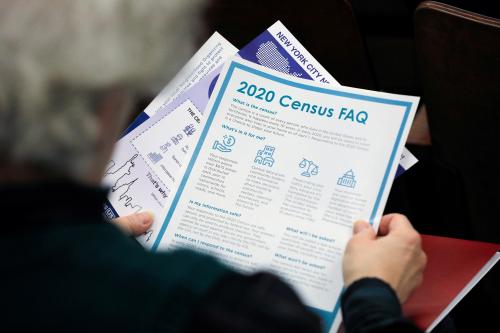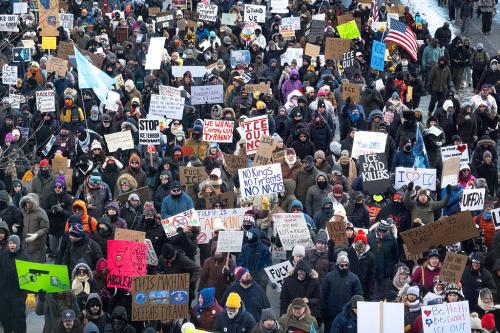Commerce Secretary Wilbur Ross’s decision this week to “reinstate” a question on citizenship status in the 2020 decennial Census (it was last asked in 1950), almost certainly will vastly increase the number of people who ignore or evade the 2020 decennial Census. The policy will certainly discourage undocumented immigrants from filling out a Census form, and so lower the official population count of nearly every state. Those states that would be most disadvantaged, however, are not those with simply the most undocumented people, such as New York and Illinois, but those 12 states whose undocumented populations account for more than the national average of 3.5 percent. That group is led, in order, by Nevada, Texas, California, New Jersey, Arizona, Florida and Maryland. For those states, the results could well mean fewer seats in Congress, fewer electoral votes, and smaller shares of more than $800 billion in annual federal funds allocated based in part on Census population data.
Ross and Sessions explicitly tied the collection of 2020 Census information to federal law enforcement. That’s what makes his directive so remarkable and so dangerous.
But the damage would be much more far-reaching. When Ross announced this decision, he said he did it at the behest of the Department of Justice and Attorney General Jeff Sessions, so DoJ could better enforce the Voting Rights Act by more accurately measuring how many people in each of the nation’s 72,000 Census tracts are eligible to vote. In so doing, Ross and Sessions explicitly tied the collection of 2020 Census information to federal law enforcement. That’s what makes his directive so remarkable and so dangerous.
My analysis, detailed below, suggests that some 24.3 million people would have good reason to skip the 2020 Census if they believe their names and addresses could be shared with law enforcement. Moreover, because most of them are not concentrated in the big blue states, and most of the federal funding tied to the Census involves programs like Medicaid, Section 8 housing assistance, and support for school lunches, the new Ross-Sessions policy could cut federal funding to the 23 mainly red states with poverty rates above the national average.
Aren’t Census Data Confidential?
To be sure, federal law protects the confidentiality of the personal information collected in the Census in no uncertain terms. Under Title 13, sections 9 and 214 of the federal code, Census employees cannot lawfully share anyone’s name and address with anyone, including law enforcement. The reasoning is clear: Without a guarantee of strict confidentiality, many people would avoid or refuse to respond to the decennial Census.
I witnessed just how seriously the Census Bureau and the law approach this question when I was the Under Secretary of Commerce overseeing the 2000 decennial Census. The Bureau received a filled-out Census form, complete with the respondent’s name and address, and a scrawled threat to the president’s life across the front. We followed the law, informing the Secret Service and telling them that under Title 13, we could not share the name and address. In this case, we thankfully knew that President Clinton’s life was not in danger, since the Census form came from a federal inmate in California. But if the threat had come from someone not behind bars, the Secret Service would have had to find another way to identify him.
But most Americans have never heard of Title 13, so what matters here is their perceptions and beliefs about the confidentiality of their Census information. In that regard, Ross and Sessions eagerly publicized the change, no doubt appealing to the administration’s anti-immigrant supporters and President Trump’s meme about undocumented voters costing him the popular vote. But tying the Census data to law enforcement in this way will be a flashing red light for not only undocumented immigrants. Millions of other Americans will be very sensitive to any intimation that filling out their Census forms might help law enforcement officials locate them, including students in default on their federal loans, parents who owe back child support, anyone with an outstanding warrant, and more. Using conservative assumptions, they add up to more than 24 million people.
Who will Census 2020 leave out?
The Census is never 100 percent accurate. Certain populations are undercounted for various reasons, and the idea that some people—including undocumented immigrants and those with outstanding arrest warrants—are afraid to participate is not a new one. But the Ross-Sessions Census policy is almost guaranteed to exacerbate those issues and lead to even more dramatic undercounting across large parts of the country.
To begin, the policy will likely cost the Census participation of not only most undocumented immigrants, but also many of the 8.8 million U.S. citizens and legal residents who live in households with 4.3 million undocumented friends and family members. If half of those households simply misstate the citizenship status of the undocumented person and the other half ignore the 2020 Census, the Census undercount from this issue alone would be 4.4 million. Add them to the other 6.8 million undocumented people in households without anyone with legal status, and the undercount comes to 11.2 million.
Millions of other Americans would have good reason to hesitate about providing their names and addresses, if they believe their data might be shared with federal law enforcement. For example, 43 percent of the 22 million Americans with federal student loans are in default or very behind in their payments arrears, which covers about 9,460,000 young Americans. If we assume, conservatively, that one-third of those in such arrears will opt for discretion and skip the 2020 Census, it comes to 3,120,000 people. Moreover, the Census collects its information from households, and most of those in default or way behind in payments on their federal student loans live in households with people not in such arrears. Again, assume that half simply leave out the household member in arrears (another 1,560,000 for the undercount) and the other half opt out of the Census. Since an average household consists of 2.54 persons, Americans in arrears on their federal student loans could add a total of another 5,522,400 people to the undercount [(1,560,000 + (1,560,000 x 2.54)], bringing the total potential undercount to 16,722,400.
The Census Bureau also reports that in 2015, 48.4 percent of the 6,807,000 parents who had custody of their children did not receive their lawfully-awarded child support. So, 3,292,000 people were in arrears on their child support. Local governments now routinely suspend the driver’s licenses of deadbeat dads (and moms), and sometimes jail those with long records of withholding child support payments. It seems reasonable that two-thirds of those in such arrears (2,195,764 people) would forgo affixing their names and addresses to forms that they believe might be shared with law enforcement. In this case, we would expect that most of their households would opt out with them, adding 5,577,241 people to the undercount. That brings the total potential undercount to 22,299,641 people.
We should also count households that include “fugitives from justice.” It’s difficult to know how many Americans have that status, because last year the DoJ purged some 500,000 people from its database of fugitives under a new policy to clean up the data on people who cannot pass background checks to buy a gun. Even so, the FBI says that some 789,000 people are currently evading outstanding warrants for felonies and serious misdemeanors, because their addresses are unknown. It is safe to assume that none of them will respond to the 2020 Census if they believe their whereabouts could be shared with law enforcement officials. When we take account of their households, they add another 2,004,060 people to the potential undercount and bring the total to 24,303,701.
None of these calculations include the normal undercount of certain groups – for example, the Census Bureau acknowledges that the 2010 Census missed about 1.5 percent of all African Americans – or the double counting of others such as retirees with two homes. Instead, the focus here is on the particular, additional impact of the Ross-Sessions policy on a citizenship question for the 2020 Census and the Voting Rights Act.
Why should we worry about counting people who entered America illegally, welch on their federal loans, or are fugitives from justice? For starters, Article I, Section 2 of the Constitution mandates a decennial census of “the whole number of free persons,” not commendable people or even just citizens. (Alas, our framers did count African-Americans as 3/5 of a free person and excluded untaxed Indians.) Anyway, failing to count any person or household harms everyone in that person’s or household’s community, since the community’s representation and access to federal funds are tied to its numbers.
This new policy will hurt red states as much or more than blue states
[T]he states with the most at stake are those with above-average shares of poor people. Sixteen states and the District of Columbia had poverty rates above the national average of 13.7 percent over the years 2014 to 2016. Ironically, only two of them (California and New Mexico) plus D.C. are blue states.
The damage of such an unprecedented undercount will not be distributed evenly or randomly across the states. As we noted, 12 states with disproportionately large undocumented populations will bear the greatest burden when it comes to losing seats in Congress, led by Nevada, Texas, California, New Jersey, Arizona and Florida. While every state has students and parents in arrears and people with outstanding warrants, cuts in federal funding based on Census data also will not be distributed evenly across the states. That’s because most of $800 billion per-year in such funds involve programs for low-income Americans, such as Medicaid, school lunches, and the S-CHIP program. The distribution of those funds across the states is based on their shares of all poor households, so the states with the most at stake are those with above-average shares of poor people. Sixteen states and the District of Columbia had poverty rates above the national average of 13.7 percent over the years 2014 to 2016. Ironically, only two of them (California and New Mexico) plus D.C. are blue states. The other 14 states facing serious cuts in federal funding are solidly red states, led by Mississippi, Louisiana, Kentucky, West Virginia, Georgia, Alabama, and Arkansas.
So, the Ross-Sessions Census policy could be a political boomerang for Donald Trump and the GOP. To be sure, of the 12 states plus D.C. that could lose seats in Congress based on disproportionately large undocumented populations, eight of them plus D.C. are blue states with 143 electoral votes—compared to four red states with 94 electoral votes. However, by vastly expanding the potential pool of uncounted people apart from undocumented immigrants, the Ross-Sessions Census policy also could result in federal funding cuts for 14 red states with 181 electoral votes—compared to two blue states (California and New Mexico) plus D.C. with just 63 electoral votes.
Editor’s note: A previous version of this article incorrectly stated that the Census last included a citizenship question in 1940. The correct year is 1950. The article has been updated to reflect this change.
The Brookings Institution is committed to quality, independence, and impact.
We are supported by a diverse array of funders. In line with our values and policies, each Brookings publication represents the sole views of its author(s).







Commentary
Trump’s Census policy could boomerang and hurt red states as well as blue states
March 30, 2018